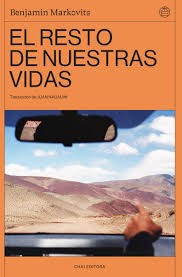
Original Language: English
Títutulu Original: The rest of our lives
Year of publication: 2025
Translation: Juan Nadalini
Valoración: Quite recommended
Express MicroRresseña:
The rest of our lives It is a very good novel about the love and wear of couple relationships. Read it!
Extended version:
Fully connected in the American tradition of “novel in which the trip occupies a fundamental place” (The anger grapes, on the road, etc), The rest of our lives It is a bittersweet reflection on the fucking life and wear that this entails, on decisions that condition present and future, about lost, wasteful or missing opportunities, etc.
The argument could summarize it that Amy committed an infidelity 12 years ago, at which time Tom decided not to separate until her little daughter turned 18 and marched to university. That moment has arrived and Tom takes a trip with his daughter from Boston to Pittsburgh.
Thus, the trip works in the as a metaphor of life, as a way of “escape” through which to recall and rethink one’s own existence, as a path of self -examination and possible redemption.
And although the trip continues and that Tom ends up crossing the country from east to west, the landscape barely has prominence. There is, therefore, a mystique of open spaces or a “praise of individual freedom.” The trip is, eminently, interior and temporary, towards a past that will not return and that has brought us here, until a present that perhaps it was not that we dream at the time.
If for something it seems to me that this novel by Benjamin Markovits stands out is by:
- How it reflects the wear that entails maturity (and not only at the sentimental level, but extends to different areas of life).
- their analysis of family relations and the dynamics of power that are established in them.
- The use of dialogues.
- The treatment that gives to something that happens at the end of the novel. I had the bad luck of going through the same and I look absolutely reflected in those pages (I do not enter details because it does not gartain anything).
- The deep feeling of sadness and hope that transmits me. Emotion and sensitivity, but well taken.
On the least positive side I have to mention the following:
- Why fuck such a high percentage of the protagonists of these novels are university professors? I know this, but I know, it’s not good or bad, but “loads me.”
- some somewhat clarified secondary plot (the labor part, especially). I know that it allows and guides the trip, but I have the feeling that they will clash with the rest of the novel.
- The elongated shadow of the Stoner of John Williams (TB I see something of the great Stephen Dixon out there).
In summary, and despite these little sticks, a more than pleasant surprise of an author absolutely unknown to me and who I really hope to have more news in the future. If possible, without taking too long!
Source: https://unlibroaldia.blogspot.com/2025/06/benjamin-markovits-el-resto-de-nuestras.html


